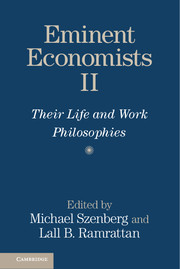Book contents
- Frontmatter
- Dedication
- Contents
- List of Contributors
- Foreword
- Preface and Acknowledgments
- Introduction
- 1 Being There: An Intellectual Journey
- 2 Social Norms in Economics and in the Economics Profession
- 3 Personal Reflections on My Professional Life
- 4 Gray Eminence?
- 5 Biochemist to Economist
- 6 Puzzles and Paradoxes: A Life in Applied Economics
- 7 Succeeding in Economics
- 8 My Research Strategy
- 9 My Philosophy of Economics, Life, and Everything (Not!)
- 10 Finding a Niche
- 11 Become an Economist – See the World
- 12 Practitioner of the Dismal Science? Who, Me? Couldn’t Be!!
- 13 One Job, Four Careers
- 14 My Life and Research Strategy
- 15 How I Ended Up Being a Multifaceted Economist and the Mentors I Have Had
- 16 Searching for My Personal Philosophy
- 17 Learning about the Evolving International Economy
- 18 Confessions of a Wellesley FEM
- 19 God, Ants, and Thomas Bayes
- 20 The Path of a Monetary Economist
- 21 Learning from the Field
- 22 Order in and through Disorder: The Invisible Hand as a Turbulent Regulator
- 23 The Education of an Economist
- 24 Faith, Science, and Religion
- 25 My Studies in International Economics
- 26 Sailing into the Wind
- 27 My Life and Work Philosophy
- 28 Scaling Fortress Economics
- 29 The Accidental Economist
- Index
13 - One Job, Four Careers
Published online by Cambridge University Press: 05 June 2014
- Frontmatter
- Dedication
- Contents
- List of Contributors
- Foreword
- Preface and Acknowledgments
- Introduction
- 1 Being There: An Intellectual Journey
- 2 Social Norms in Economics and in the Economics Profession
- 3 Personal Reflections on My Professional Life
- 4 Gray Eminence?
- 5 Biochemist to Economist
- 6 Puzzles and Paradoxes: A Life in Applied Economics
- 7 Succeeding in Economics
- 8 My Research Strategy
- 9 My Philosophy of Economics, Life, and Everything (Not!)
- 10 Finding a Niche
- 11 Become an Economist – See the World
- 12 Practitioner of the Dismal Science? Who, Me? Couldn’t Be!!
- 13 One Job, Four Careers
- 14 My Life and Research Strategy
- 15 How I Ended Up Being a Multifaceted Economist and the Mentors I Have Had
- 16 Searching for My Personal Philosophy
- 17 Learning about the Evolving International Economy
- 18 Confessions of a Wellesley FEM
- 19 God, Ants, and Thomas Bayes
- 20 The Path of a Monetary Economist
- 21 Learning from the Field
- 22 Order in and through Disorder: The Invisible Hand as a Turbulent Regulator
- 23 The Education of an Economist
- 24 Faith, Science, and Religion
- 25 My Studies in International Economics
- 26 Sailing into the Wind
- 27 My Life and Work Philosophy
- 28 Scaling Fortress Economics
- 29 The Accidental Economist
- Index
Summary
Most people spend the greater part of their working lives carrying out more or less the same activity but from time to time face the inconvenience of changing jobs. I’ve had the opposite experience. As I write this essay, I am beginning my fortieth year in the same job: economics professor at Harvard. But from time to time I’ve shifted the focus of my work to such an extent that the new path feels, in many ways, like a new career – not just different questions to consider but different starting presumptions, a different set of relevant institutions, different background literature, and a different cast of characters whose contributions and judgment matter.
To be sure, all this is a matter of perspective. To some – perhaps to most people not engaged in an academic or research enterprise – what has seemed to me like a series of career changes may well appear far more seamless. After all, I’ve continued throughout to write books and articles about economics and to teach economics to both graduate students and undergraduates at my university. Isn’t that all really the same thing? From my perspective, no it isn’t. To me, these transitions increasingly have had the feeling of career changes. To the question of what it’s like to have “done the same thing” for so many years, my reaction is that I wouldn’t know; I haven’t.
- Type
- Chapter
- Information
- Eminent Economists IITheir Life and Work Philosophies, pp. 187 - 202Publisher: Cambridge University PressPrint publication year: 2014



